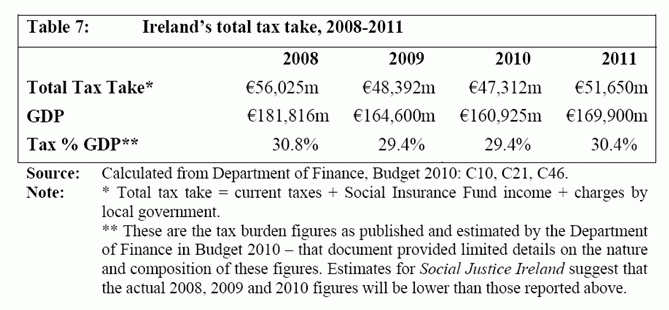Ireland's total tax-take is among the lowest in the EU and should be increased to produce just and fair adjustment
Social Justice Ireland has claimed that Government’s proposals to adjust Ireland’s budget in the next four years is unjust and unfair. Government is proposing to achieve adjustments of €15bn by 2014 through taking €10bn in cuts and only €5bn in tax increases. Ireland’s total tax-take is one of the lowest in the European Union. It is possible to raise Ireland’s total tax-take by €10bn and still remain a low-tax country. Instead Government proposes to target the poor, the sick and the low-paid while protecting the rich and the strong. This approach is disgraceful, unjust and unfair. The following are key facts that are being ignored by government and many commentators in the current debate.
- Despite significant increases in the tax-take from the PAYE sector in the last two Budgets, the scale of collapse in Ireland’s tax revenues has been dramatic. National taxes (those announced in the Budget and collected centrally) have fallen by over €16b since 2007 with the largest fall in areas such as capital gains tax, stamp duties, corporation taxes and VAT. Decreases in income taxes have been somewhat offset by increased revenues from the income levy. Overall, total tax receipts have fallen from in excess of €47 billion in 2007 to €32.5 billion in 2009; and current trends suggest that the 2010 figure is likely to be marginally lower than this (perhaps not as low as the €31 billion figure which the Department of Finance signalled in the December 2009 Budget).
- The impact of these declines in taxation income, reflecting the scale of the national and international recession and the instability and narrowness of the national tax base, has had dramatic effects on the overall tax burden. Table 7 below (taken from Social Justice Ireland’s recent publication ‘An Agenda for a New Ireland’, reports on this decline using data from Eurostat and Budget 2010. It shows how Ireland’s overall taxation burden has dropped to 29.4 per cent of GDP in 2009 and 2010 – levels equivalent to those among the lowest European countries. (Full text can be accessed here.)
- While a proportion of the tax decline is related to the recession, a large part is structural and requires attention. Social Justice Ireland believes that over the next four years policy should focus on increasing Ireland’s tax take to 34.9 per cent of GDP, a figure defined by Eurostat as ‘low-tax’. As a policy objective, Ireland should remain a low-tax economy, but not one incapable of adequately supporting the economic, social and infrastructural requirements necessary to complete our convergence with the rest of Europe.
- Government proposes to increase the total tax-take in 2011 by €1.5bn and by 2014 to reach an increase of €5bn. However, cuts of €4.5bn are being planned for 2011 rising to €10bn by 2014. This distribution of the ‘hit’ required to reduce Ireland’s borrowing by 2014 to 3% of GDP is unfair and unjust. The proportions should be the other way around.
- Consequently, in the coming four budgets tax increases should account for two-thirds of the adjustment required and only one third should come through cuts in public expenditure.

Social Justice Ireland states that while both the IMF and the Government have said that poor people will be protected and that everything must be on the table when decisions are made concerning the adjustments required in these difficult times, this is accompanied by an insistence that:
- Senior bond-holders cannot be asked to bear any part of the adjustment;
- The corporation tax rate cannot be increased;
- A greater part of the adjustments will come through expenditure cuts rather than through tax increases.
This approach is hypocritical and deeply unjust. Either everything is on the table or it is not.
Social Justice Ireland believes a fairer future is possible. We urge Government, the IMF, the European Central Bank and the European Union to act fairly and justly in the coming days, weeks and months as they design a pathway out of the present difficult situation.